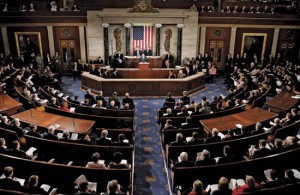Mission accomplished: US uses bin Laden hoax to expand basis for so-called War On Terror
Resolution expands basis for war on terror
The Washington Times, Wednesday, May 11, 2011.
Less than two weeks after U.S. special operations commandos killed Osama bin Laden, a resolution viewed as an expansion of the legal basis for the global war on terror is moving through Congress.
The House Armed Services Committee added language to the fiscal 2012 Defense Authorization bill on Wednesday that would define the current war on al Qaeda to include the Taliban and affiliated armed groups, affirming the U.S. District Court for the District of Columbia’s interpretation of the 2001 war resolution.
The committee began marking up the bill on Wednesday. It sets out the guidance for the U.S. defense budget.
The provision, known as the Authorization for the Use of Military Force, is key legislation used by lawyers for both President George W. Bush and President Obama as a legal basis for detaining terrorists without trial who are captured around the world. The legislation also was used to authorize U.S. drone strikes and special operations forces raids in countries where the United States is not formally at war.
Civil liberties groups have expressed worries that the new legislation, sponsored by Rep. Howard P. “Buck” McKeon, California Republican and committee chairman, significantly expands the scope of the global war on terror.
The McKeon resolution would replace legislation passed by Congress on Sept. 14, 2001 that authorized war on the people and groups that planned and carried out the Sept. 11 attacks.
The new authorization is broader. It states that “the president has the authority to use all necessary and appropriate force during the current armed conflict with al Qaeda, the Taliban, and associated forces pursuant to the authorization for use of military force.”
In a statement this week, Mr. McKeon said the new resolution does not expand authorities. “The legislation better aligns the old legal authorities used to detain and prosecute those intent on attacking America with the threats our country faces today,” he said.
Robert M. Chesney, a law professor at the University of Texas who specializes in national security law, said in an interview that the new authority largely codifies the status quo understanding of war powers used by both Mr. Bush and Mr. Obama against the Taliban and al Qaeda.
But he said it was trickier on the question of the “associated groups” mentioned in the proposed resolution.
“On the one hand, the associated forces makes a lot of sense because there are groups like the Haqqani network that have taken up arms against us,” Mr. Chesney said.
“The harder question is how do you define this category so it does not become a blank check to wage war on groups.”
Chris Anders, senior legislative counsel for the American Civil Liberties Union, said the proposed new legislation is problematic because it does not envision an end date to the war on terror.
“What is the goal? Is the goal that there will no terrorism suspects alive or outside of prison anywhere in the world?” he asked. “That can’t be the goal of the United States, that is an incredible proposition. But that appears to be the goal of the McKeon legislation. The result would be war everywhere and anywhere.”
As the result of the killing of the leader of al Qaeda, many in Congress are seeking ways to wind down the war on terror. Both the chairman and the ranking member of the Senate Foreign Relations Committee recently called for a de-escalation in Afghanistan.










Leave your response!